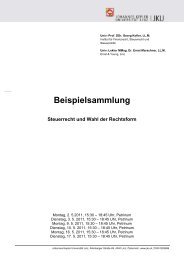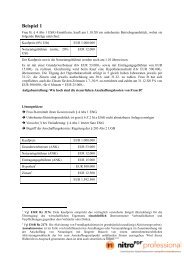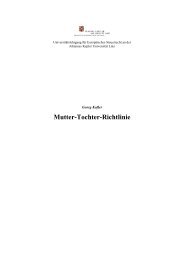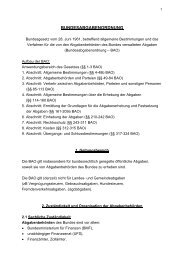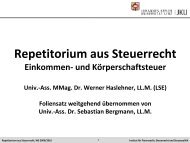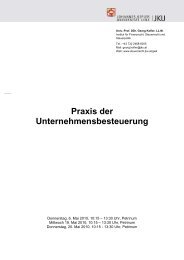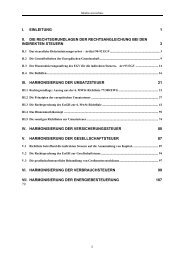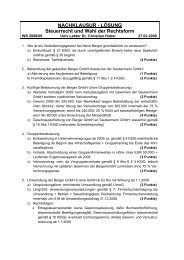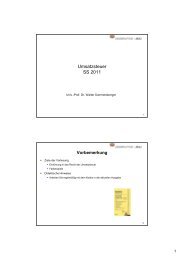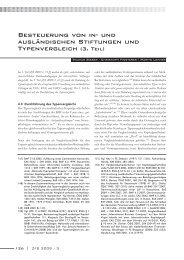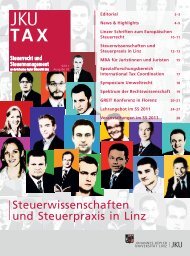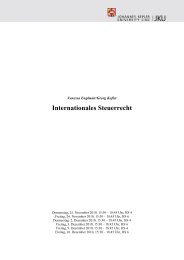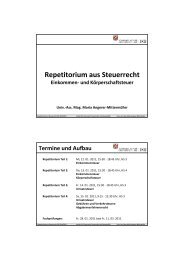European Tax Law - JKU
European Tax Law - JKU
European Tax Law - JKU
Sie wollen auch ein ePaper? Erhöhen Sie die Reichweite Ihrer Titel.
YUMPU macht aus Druck-PDFs automatisch weboptimierte ePaper, die Google liebt.
Another point of criticism echoes the comments of<br />
some <strong>European</strong> authors: “... making nondiscrimination<br />
the sole criterion for the choice necessarily suppresses<br />
considerations of efficiency, fairness, and administrability<br />
that should inform difficult tax policy decisions.” 11<br />
The principles that should govern national tax policy are<br />
pushed away by the overriding concern for free movement<br />
and non-discrimination. This is a judicial reshaping<br />
of tax policy that again should be left to the legislator<br />
and does not belong to the competences of the Court.<br />
2.2. ECJ’s inconsistency in applying territoriality and<br />
sovereignty of the Member States in determining<br />
tax jurisdiction and the creation of new “taxing<br />
rights”<br />
The most radical criticism was formulated by Dennis<br />
Weber in his Helsinki report: “The ECJ case law is incorrect<br />
from a dogmatic point of view because the Court<br />
does not pay heed to the consequences of its own basic<br />
assumptions e.g. that the Member States are free to<br />
determine the criteria for taxation in order to delimit tax<br />
jurisdiction and to avoid double taxation.” 12 Weber’s criticism<br />
is based on the following reasoning: (1) capital and<br />
labour-import neutrality (CLIN) is the principle that<br />
best achieves the objectives of the internal market, (2)<br />
CLIN requires applying the principle of territoriality, e.g.<br />
taxation in accordance with the rules of the state of<br />
source or origin and this principle applies to non-resident<br />
as well as resident taxpayers, (3) the Member States<br />
have absolute sovereignty in determining their tax jurisdiction<br />
and in designing the way in which they eliminate<br />
double taxation, and (4) the ECJ has accepted the principle<br />
of territoriality and the sovereignty of the Member<br />
States to determine tax jurisdiction, but (5) the ECJ has<br />
not drawn the logical consequences of its position as<br />
illustrated in particular by its decisions in Bosal Holding,<br />
Marks & Spencer, Manninen and Ritter-Coulais.<br />
2.2.1. CLIN as the best solution for the internal market<br />
In the debate between CLEN and CLIN, Weber favours<br />
CLIN as the best solution for the internal market. It is<br />
interesting to note that this view is quite different from<br />
the position defended by Graetz and Warren. Weber,<br />
however, pointed out that competition is not only<br />
between private undertakings, but that “competition<br />
between legal systems is one of the foundations of the<br />
Internal Market”. Competition between legal systems<br />
includes competition between tax systems. Competition<br />
between tax systems enhances the efficiency of governments,<br />
which contributes to the overall efficiency of<br />
economic systems.<br />
2.2.2. Territoriality as a consequence of CLIN<br />
The next step in Weber’s reasoning is that taxation on the<br />
basis of territoriality is the principle which achieves<br />
CLIN most adequately. This principle has also been<br />
accepted by the ECJ as a legitimate criterion by which<br />
the Member States, exercising their sovereign taxing<br />
power, determine their tax jurisdiction. On incoming<br />
Articles<br />
movements of persons, services or capital, the ECJ has<br />
consistently applied the fundamental freedoms taking<br />
into account the limitation on tax jurisdiction based on<br />
the principle of territoriality. The problem, however, is<br />
with the application of the principle of territoriality to<br />
outgoing movements by resident taxpayers.<br />
2.2.3. By negating territoriality, the ECJ is creating new<br />
“taxing rights”<br />
The ECJ has recognized the power of the Member States<br />
to decide the criteria for determining their tax jurisdiction<br />
and avoiding double taxation. This implies that the<br />
Member States are free (sovereign) to limit their taxing<br />
rights and thus not to levy tax on certain taxpayers or<br />
types of income. The Member States have restricted their<br />
tax jurisdiction either unilaterally or bilaterally in<br />
treaties. In doing so, they applied the principle of territoriality<br />
to certain outgoing movements of persons or capital<br />
and, as a consequence, these persons or capital, by<br />
exercising their freedom and moving abroad, have left<br />
the tax jurisdiction of a Member State. “Disadvantages<br />
arising because a certain person is not liable to tax or<br />
because certain (negative) income falls outside the tax<br />
base are ... not prohibited restrictions,” and further “[i]f<br />
limiting tax jurisdiction were to be considered a restriction<br />
in certain circumstances (and the ECJ were thus<br />
actually to require that a person or type of income had to<br />
be subject to tax), Community law would be creating<br />
taxing rights. This would be a direct breach of Member<br />
State sovereignty”. 13 García Prats in his report came to<br />
similar conclusions.<br />
2.2.4. Limitations on the fundamental freedoms as a<br />
factor of negative integration<br />
A similar criticism from a different point of view has<br />
been formulated by Julian Ghosh. Starting from an<br />
analysis of the functions of residence and source in<br />
international taxation, he distinguishes between the<br />
function of residence, on the one hand, in identifying the<br />
tax unit and, on the other, in identifying the tax base, setting<br />
the rates, and regulating administration, assessment,<br />
collection and recovery of taxes. This distinction seems<br />
to correspond to the distinction made by the ECJ<br />
between rules determining tax jurisdiction and rules<br />
exercising tax jurisdiction. In the view of Ghosh: “... the<br />
use of residence to define the tax unit cannot, as a matter<br />
of principle, result in a breach of the EC treaty, whereas<br />
the use of residence to define the tax base of a taxing<br />
State ... could indeed result in such a breach.” 14 This<br />
rejoins the ECJ’s reasoning in Gilly15 that the determina-<br />
11. Id. at 1212.<br />
12. Accounting and <strong>Tax</strong>ation & Assessment of ECJ Case <strong>Law</strong>, 2007 EATLP<br />
Congress, Helsinki (2008), Report submitted by Denis Weber, at 113, 115.<br />
13. Id. at 122.<br />
14. Ghosh, supra note 7, at 3.<br />
15. Case C-336/96, Gilly, 12 May 1998, Para. 30: “Although the criterion of<br />
nationality appears as such in the second sentence of Article 14(1) for the purpose<br />
of allocation of fiscal jurisdiction, such differentiation cannot be<br />
regarded as constituting a discrimination prohibited under art. 48 of the<br />
Treaty.”<br />
© IBFD BULLETIN FOR INTERNATIONAL TAXATION MARCH 2008 91




